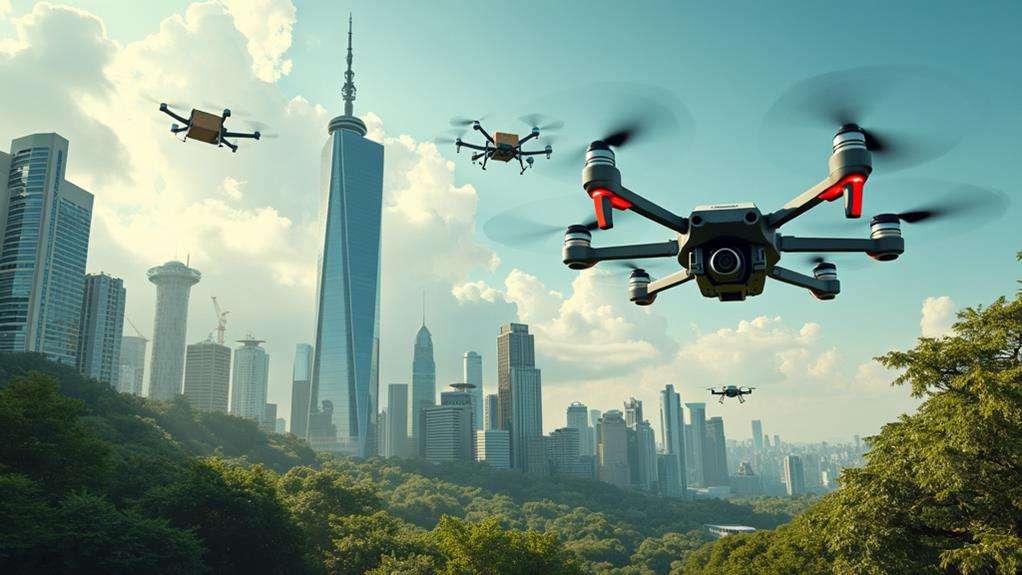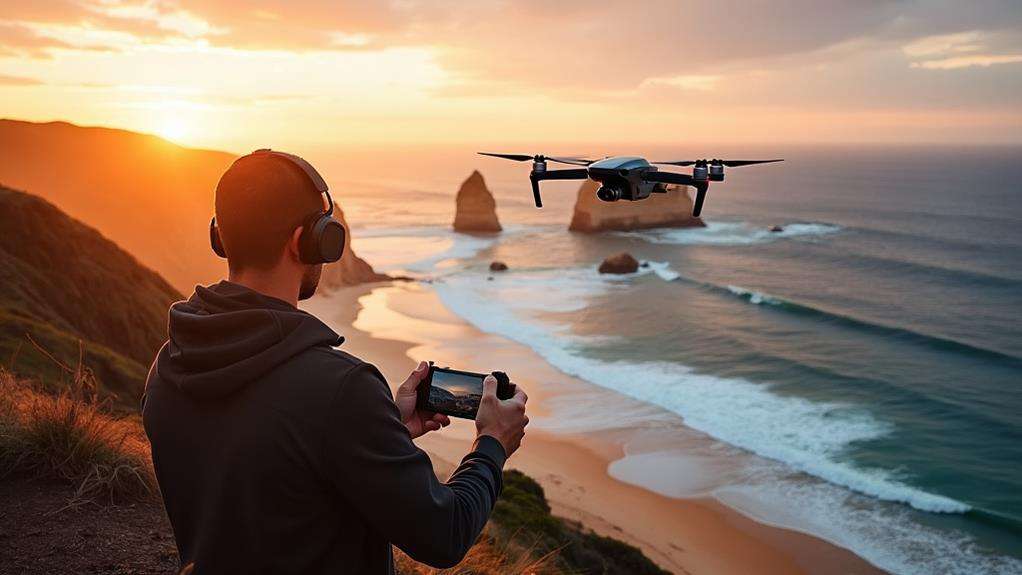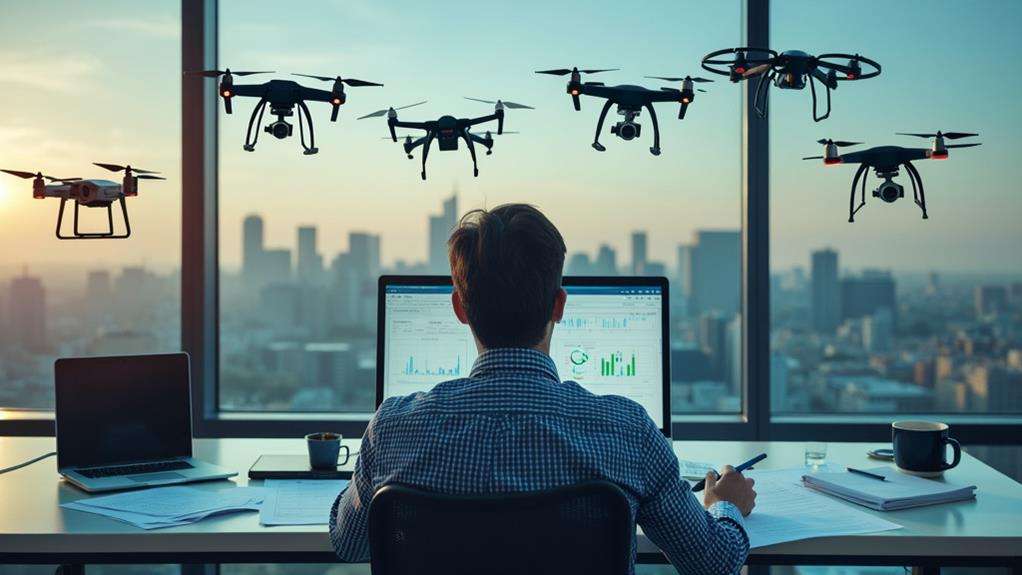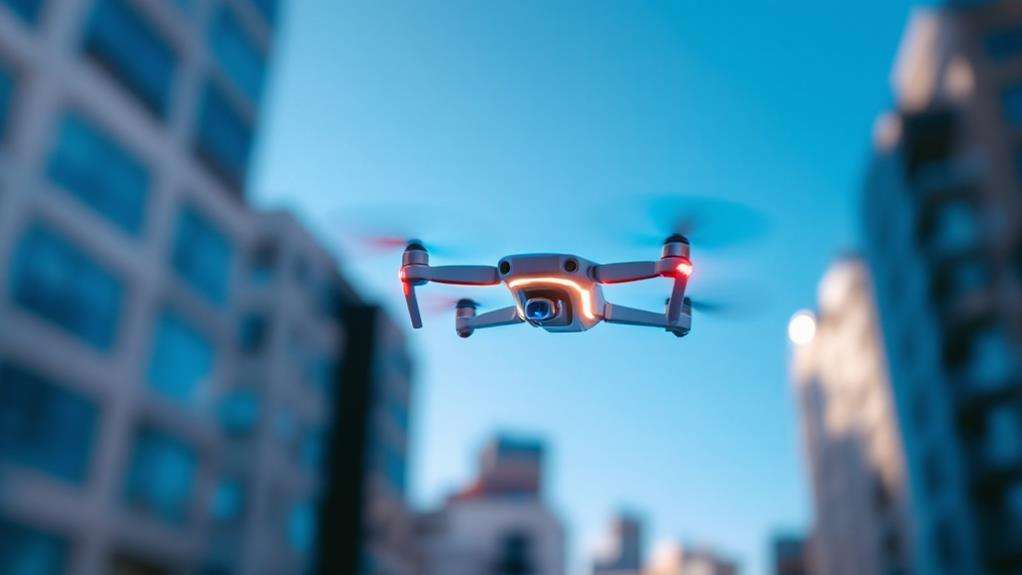What Careers Use Drones?

You might be surprised by the diverse range of careers involving drones. Opportunities include piloting UAVs for data collection, capturing aerial imagery, and maintaining these sophisticated devices. Data analysts transform collected information into actionable insights, while sales representatives, research scientists, and regulatory specialists all contribute to this rapidly evolving industry. Want to explore how these roles are shaping the future and what skills they require? There's much more to uncover.
Drone Pilot
As a drone pilot, you're at the controls of unmanned aerial vehicles (UAVs) that serve various purposes, from capturing stunning aerial photographs to conducting detailed infrastructure inspections. Your role is diverse and dynamic, encompassing everything from route planning to data collection. To operate commercially, you must obtain FAA certification, ensuring compliance with aviation regulations and legal parameters.
In the field, your responsibilities extend beyond flying the drone. You must maintain the equipment, ensuring it is in optimal condition for every flight. Data collection is a significant aspect of your job, as the information you gather provides valuable insights for clients in industries such as agriculture, real estate, and emergency services. This data assists farmers in monitoring crops, real estate agents in showcasing properties, and emergency services in assessing disaster areas.
The demand for skilled drone pilots is growing, leading to exciting career opportunities. Salaries typically range between $60,000 and $80,000 annually, with experienced pilots in specialized fields earning upwards of $100,000. Job openings are frequently listed on platforms like ZipRecruiter, reflecting the rapid expansion of this field.
Drone Technician
While drone pilots navigate the skies, the role of a Drone Technician is crucial behind the scenes. As a Drone Technician, you're responsible for maintaining and repairing unmanned aerial vehicles (UAVs), ensuring they operate smoothly and safely. This involves troubleshooting technical issues, which requires a solid understanding of various drone systems and electronic components. Familiarity with the software used in drone operations is also essential.
Drone technicians are vital across several industries, including agriculture, emergency services, and more. Your expertise ensures that drones can effectively perform tasks such as crop monitoring and search and rescue operations. The average salary for this role ranges from $50,000 to $70,000 annually, depending on your experience and location.
Key aspects of being a Drone Technician include:
- Maintenance and Repair: Regularly inspecting and fixing drones to keep them in optimal condition.
- Technical Proficiency: Understanding various drone systems and electronic components.
- Software Knowledge: Being adept at using the software that powers drone operations.
- Industry Diversity: Working across multiple sectors like agriculture, photography, and emergency services.
Continuous advancements in drone technology offer ample opportunities to enhance your skills and adapt to new tools in the ever-evolving drone industry.
Drone Photographer

Drone photographers capture breathtaking aerial images and videos using unmanned aerial vehicles (UAVs), offering unique perspectives for real estate, events, marketing, and more. As a drone photographer, mastering both drone piloting and aerial photography techniques is essential. Proficiency in post-processing images with software like Adobe Photoshop or Lightroom is also crucial to deliver polished, professional results.
Drone photography goes beyond simply flying a drone. It involves understanding composition, lighting, and angles to create stunning visuals from the sky. With annual salaries typically ranging from $40,000 to $75,000, earnings depend on experience, location, and industry demand. Commercial drone photographers often require FAA certification to ensure compliance with aviation regulations and safety protocols, adding credibility to their services.
Networking and building a professional portfolio are vital for attracting clients and securing jobs. Showcasing your best work can set you apart in a competitive market. Whether capturing sweeping landscapes or dynamic event shots, your unique aerial perspectives can significantly impact your clients' projects.
Drone Data Analyst
Ever wondered how drones can revolutionize data analysis across various industries? As a Drone Data Analyst, you'll delve into the world of aerial data, converting raw information from drone flights into actionable insights. This cutting-edge technology is being utilized in sectors such as agriculture, construction, and environmental studies to boost efficiency and enable informed decision-making.
In this role, you'll work with complex datasets, including aerial imagery and remote sensing data, to identify trends and direct project strategies. Your expertise in data visualization and analysis tools, along with proficiency in Geographic Information Systems (GIS), is essential for success. Here's what you can expect:
- Competitive Salary: Earn between $65,000 and $90,000 annually, depending on your experience and industry.
- Growing Demand: The need for skilled drone data analysts is increasing as more industries adopt drone technology.
- Diverse Applications: Apply your skills across various sectors, from monitoring crop health in agriculture to tracking environmental changes.
- Essential Skills: Master data visualization, GIS, and remote sensing to excel in this field.
If you're seeking a dynamic career at the intersection of technology and data analysis, becoming a Drone Data Analyst could be the perfect fit.
Drone Sales Representative

Embarking on a career as a drone sales representative offers a dynamic and rewarding opportunity. Earnings typically range between $50,000 and $90,000 annually, with the potential for additional commissions based on performance. Success in this role requires a thorough understanding of drone technology and market trends, as well as the ability to build and maintain strong client relationships.
Your responsibilities will include demonstrating drone products and services to potential customers, highlighting their capabilities and benefits to close sales. Proficiency in sales techniques, customer service, and knowledge of the specific applications and industries that utilize drones will provide a competitive edge.
Networking within the drone industry is essential. Attending trade shows and events can significantly enhance your career prospects and sales opportunities, offering the chance to meet potential clients and stay informed about the latest advancements in drone technology.
Drone Research Scientist
As a Drone Research Scientist, you will advance drone technology through innovations in artificial intelligence, machine learning, and robotics. You will collaborate with academic institutions, government agencies, and private industry to tackle complex challenges. Your responsibilities include testing prototypes, analyzing data for safety and efficiency, and ensuring regulatory compliance.
Research Focus Areas
Drone Research Scientists are at the forefront of innovation, constantly pushing the boundaries of what's possible in drone technology. These experts advance drone technology and applications by conducting research in areas like artificial intelligence, machine learning, and robotics. Their work is both theoretical and practical, as they operate drones and gather data to develop new methodologies and improve existing systems.
Key research focus areas for Drone Research Scientists include:
- Navigation Systems: Enhancing the precision and reliability of drone navigation.
- Data Collection Techniques: Innovating ways to gather and analyze data more effectively.
- Operational Efficiency: Streamlining drone operations to maximize performance.
- Safety and Compliance: Ensuring that all drone activities meet regulatory standards.
These scientists often collaborate with academic institutions and industry stakeholders, bridging the gap between theoretical research and practical applications. With a strong foundation in engineering or computer science, they bring a wealth of knowledge to the table, making them invaluable in the quest for better drone technology. The role of a Drone Research Scientist is both challenging and rewarding, with salaries typically ranging from $80,000 to $120,000 annually, reflecting the high level of expertise required.
Technological Innovations
Drone Research Scientists are not just focused on theoretical advancements; they actively contribute to technological innovations that shape the future of drone technology. By working on the development and enhancement of unmanned aircraft systems, they are at the forefront of cutting-edge research, exploring areas like artificial intelligence, machine learning, and robotics to improve drone functionalities and capabilities.
With an annual earning potential between $80,000 and $120,000, their expertise is in high demand. Collaborating with academic institutions and industry partners, these scientists dive into new applications and refine existing systems. Their work is not confined to the lab; they publish findings in scientific journals and present at industry conferences, thereby pushing the boundaries of what is possible in the drone sector.
A solid background in engineering, computer science, or a related field is essential. Strong analytical and problem-solving skills help them tackle complex challenges in drone technology. As a Drone Research Scientist, their contributions in technological innovations directly impact the evolution of unmanned aircraft systems, ensuring they become smarter, more efficient, and increasingly versatile. Their role is pivotal in defining the future landscape of drone technology.
Collaboration Opportunities
Collaboration is fundamental for Drone Research Scientists, offering a wide array of opportunities across diverse industries. In this field, you won't be working in isolation but will actively engage with academic institutions, industry partners, and government agencies to push the limits of drone technology.
As a Drone Research Scientist, your collaborative opportunities include:
- Interdisciplinary Teams: Collaborate with experts in engineering, computer science, environmental science, and public policy to address complex challenges and develop innovative solutions.
- Industry Partnerships: Work with leading companies to create advanced algorithms for flight navigation and new methods for data collection.
- Government Projects: Partner with agencies to enhance emergency response protocols and improve environmental monitoring using drones.
- Academic Research: Collaborate with universities to explore cutting-edge advancements in artificial intelligence and machine learning applicable to drone technology.
These collaborations not only facilitate professional growth but also drive significant advancements in drone capabilities and applications. With an average salary ranging from $80,000 to $120,000 annually, the role of a Drone Research Scientist is both financially rewarding and intellectually stimulating.
Drone Regulatory Specialist

A Drone Regulatory Specialist plays a crucial role in the rapidly growing drone industry by ensuring operations adhere to various local, state, and federal regulations. You'll collaborate closely with drone operators and pilots, guiding them through the complex landscape of regulatory compliance. Your expertise guarantees that all drone activities conform to aviation laws and safety standards, making you indispensable to organizations utilizing drone technology.
With a deep understanding of aviation law, you'll work with government agencies to develop and implement frameworks that promote safe and efficient drone usage. Your knowledge of emerging drone technologies and their applications is essential for addressing regulatory challenges and fostering industry growth. As the industry expands, your role becomes increasingly vital, ensuring that innovation aligns with safety and legal requirements.
The financial rewards reflect the specialized knowledge required, with an annual salary ranging from $70,000 to $95,000. This competitive compensation underscores the value of your expertise in maintaining compliance within a dynamic regulatory environment. As the drone industry continues to grow, the demand for your skills will rise, emphasizing the critical importance of your role in sustaining and advancing this innovative field.




